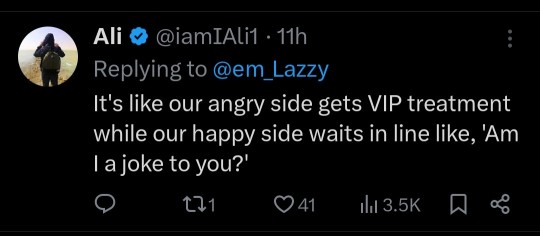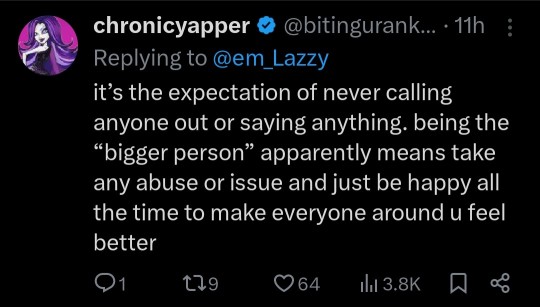#mental and emotional health.
Text
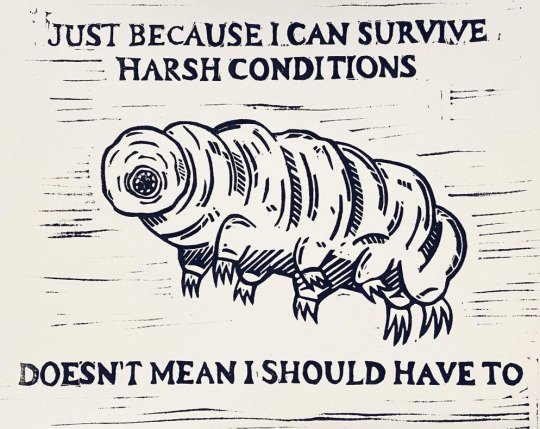
#mental health#self reflection#be yourself#self improvement#self help#new life#letting go#inspirational quotes#new beginnings#positivity#therapy#self therapy#survival#emotional support#life lessons
58K notes
·
View notes
Text


though the movie might be cancelled, yuri on ice will live forever in our hearts. thank you yoi fandom, it's been real ♡
#yuri on ice#yoiedit#yoi#victuuri#ice adolescence#anime gif#*gifs#animangahive#dailyshounenai#userkarura#usergojoana#userhanyi#useralphonse#usertorichi#usermoonz#usericybtch#userheidi#usergokalp#userartless#homuras#himawaari#this is not goodbye this is still my house!!!#devastated but not surprised tbh but i still wanted to channel my emotions somehow and just. express how much this show means to me so here#this thank you goes out to u guys. the fandom#mappa can eat a brick btw <3#god i wish i could articulate just how special yoi is to me#it truly resonated with me like very few other pieces of media have (i can count them with one hand in fact)#it was sooooo revolutionary and ahead of its time not just in terms of queerness but also in terms of mental health#it truly changed me as a person and i just. really appreciate how earnest and kind it was above all#thank you yoi. you will be a part of me forever <3
9K notes
·
View notes
Text
Why Am I Feeling Sad? Understanding Your Emotions.
Many people, through lack of knowledge, fail to identify their bereavement. They carry a load of grief around with them, totally unaware of what it might be. They feel sad, lonely and lost and can’t work out why.
We have all experienced events we would rather not remember. But the truth is that the longer we live, the more chance we have of experiencing upsetting or unwanted experiences. Grief and bereavement can be like that. Unwanted and definitely upsetting.
Let’s Start the Conversation on Grief, Bereavement and Mourning.
Photo by Joshua Rawson-Harris on Unsplash
So, what exactly are bereavement and…

View On WordPress
#bereavement#Feeling Sad#grief#grief recovery#Grief Relief:#mental and emotional health.#Mourning.#Paula Rose Parish#Psychological Health Care
0 notes
Text
As I keep shouting into the void, pathologizers love shifting discussion about material conditions into discussion about emotional states.
I rant approximately once a week about how the brain maturity myth transmuted “Young adults are too poor to move out of their parents’ homes or have children of their own” into “Young adults are too emotionally and neurologically immature to move out of their parents’ homes or have children of their own.”
I’ve also talked about the misuse of “enabling” and “trauma” and “dopamine” .
And this is a pattern – people coin terms and concepts to describe material problems, and pathologization culture shifts them to be about problems in the brain or psyche of the person experiencing them. Now we’re talking about neurochemicals, frontal lobes, and self-esteem instead of talking about wages, wealth distribution, and civil rights. Now we can say that poor, oppressed, and exploited people are suffering from a neurological/emotional defect that makes them not know what’s best for themselves, so they don’t need or deserve rights or money.
Here are some terms that have been so horribly misused by mental health culture that we’ve almost entirely forgotten that they were originally materialist critiques.
Codependency
What it originally referred to: A non-addicted person being overly “helpful” to an addicted partner or relative, often out of financial desperation. For example: Making sure your alcoholic husband gets to work in the morning (even though he’s an adult who should be responsible for himself) because if he loses his job, you’ll lose your home. https://www.nytimes.com/2022/07/08/opinion/codependency-addiction-recovery.html
What it’s been distorted into: Being “clingy,” being “too emotionally needy,” wanting things like affection and quality time from a partner. A way of pathologizing people, especially young women, for wanting things like love and commitment in a romantic relationship.
Compulsory Heterosexuality
What it originally referred to: In the 1980 in essay "Compulsory Heterosexuality and Lesbian Existence," https://www.journals.uchicago.edu/doi/abs/10.1086/493756 Adrienne Rich described compulsory heterosexuality as a set of social conditions that coerce women into heterosexual relationships and prioritize those relationships over relationships between women (both romantic and platonic). She also defines “lesbian” much more broadly than current discourse does, encompassing a wide variety of romantic and platonic relationships between women. While she does suggest that women who identify as heterosexual might be doing so out of unquestioned social norms, this is not the primary point she’s making.
What it’s been distorted into: The patronizing, biphobic idea that lesbians somehow falsely believe themselves to be attracted to men. Part of the overall “Women don’t really know what they want or what’s good for them” theme of contemporary discourse.
Emotional Labor
What it originally referred to: The implicit or explicit requirement that workers (especially women workers, especially workers in female-dominated “pink collar” jobs, especially tipped workers) perform emotional intimacy with customers, coworkers, and bosses above and beyond the actual job being done. Having to smile, be “friendly,” flirt, give the impression of genuine caring, politely accept harassment, etc.
https://weld.la.psu.edu/what-is-emotional-labor/
What it’s been distorted into: Everything under the sun. Everything from housework (which we already had a term for), to tolerating the existence of disabled people, to just caring about friends the way friends do. The original intent of the concept was “It’s unreasonable to expect your waitress to care about your problems, because she’s not really your friend,” not “It’s unreasonable to expect your actual friends to care about your problems unless you pay them, because that’s emotional labor,” and certainly not “Disabled people shouldn’t be allowed to be visibly disabled in public, because witnessing a disabled person is emotional labor.” Anything that causes a person emotional distress, even if that emotional distress is rooted in the distress-haver’s bigotry (Many nominally progressive people who would rightfully reject the bigoted logic of “Seeing gay or interracial couples upsets me, which is emotional labor, so they shouldn’t be allowed to exist in public” fully accept the bigoted logic of “Seeing disabled or poor people upsets me, which is emotional labor, so they shouldn’t be allowed to exist in public”).
Battered Wife Syndrome
What it originally referred to: The all-encompassing trauma and fear of escalating violence experienced by people suffering ongoing domestic abuse, sometimes resulting in the abuse victim using necessary violence in self-defense. Because domestic abuse often escalates, often to murder, this fear is entirely rational and justified. This is the reasonable, justified belief that someone who beats you, stalks you, and threatens to kill you may actually kill you.
What it’s been distorted into: Like so many of these other items, the idea that women (in this case, women who are victims of domestic violence) don’t know what’s best for themselves. I debated including this one, because “syndrome” was a wrongful framing from the beginning – a justified and rational fear of escalating violence in a situation in which escalating violence is occurring is not a “syndrome.” But the original meaning at least partially acknowledged the material conditions of escalating violence.
I’m not saying the original meanings of these terms are ones I necessarily agree with – as a cognitive liberty absolutist, I’m unsurprisingly not that enamored of either second-wave feminism or 1970s addiction discourse. And as much as I dislike what “emotional labor” has become, I accept that “Women are unfairly expected to care about other people’s feelings more than men are” is a true statement.
What I am saying is that all of these terms originally, at least partly, took material conditions into account in their usage. Subsequent usage has entirely stripped the materialist critique and fully replaced it with emotional pathologization, specifically of women. Acknowledgement that women have their choices constrained by poverty, violence, and oppression has been replaced with the idea that women don’t know what’s best for themselves and need to be coercively “helped” for their own good. Acknowledgement that working-class women experience a gender-and-class-specific form of economic exploitation has been rebranded as yet another variation of “Disabled people are burdensome for wanting to exist.”
Over and over, materialist critiques are reframed as emotional or cognitive defects of marginalized people. The next time you hear a superficially sympathetic (but actually pathologizing) argument for “Marginalized people make bad choices because…” consider stopping and asking: “Wait, who are we to assume that this person’s choices are ‘bad’? And if they are, is there something about their material conditions that constrains their options or makes the ‘bad’ choice the best available option?”
#mad pride#neurodiversity#ableism#ageism#youth rights#liberation#disability rights#classism#capitalism#mental health culture#pop psychology#feminism#emotional labor
6K notes
·
View notes
Text
You deserve a calm love with somebody who is good for your mental health and nervous system.
#quotes#feelings#emotions#love#romantic quotes#love quotes#calm vibes#wise words#thoughtful#good love#true love#mental health#you deserve peace#nerve#dumblr
21K notes
·
View notes
Text
Green Flags in Communication 💚💬
"I want to know when I hurt your feelings."
This shows they are willing to understand and acknowledge the impact of their actions.
"I don't want you to feel alone in this."
This shows empathy and indicates that the person is supportive and does not want the person to deal with issues alone.
"I've been struggling with ___”
This demonstrates vulnerability and trust, as the person is open about their struggles.
"How have you been feeling about ___? I know it's been on your mind a lot."
This shows concern for the other person's issues or worries, showing that they are listening and care about what's important to the other person.
"I feel __ when you __; are you open to trying __ next time?"
This is an example of constructive communication.
"What do you need from me when this happens with your family?"
This shows awareness and sensitivity to the persons family dynamics and a willingness to provide support.
"I appreciate when you ___.”
Expressing appreciation is vital for positive reinforcement and acknowledging the efforts and qualities of the other person.
"I didn't handle that well."
This is a sign of self-awareness and accountability, recognizing one's own mistakes and being open to learning and growth.
"I'm sorry, I was wrong to say that. I'll try to be more mindful in the future."
Shows you are able to apologize genuinely and a commitment to improving behavior.
"Tell me more about that; I'm really interested in hearing your perspective."
Indicates a genuine interest in the other person's thoughts and feelings.
"I noticed you seemed a bit off today. Is everything okay?"
It shows you are attentive to the other person's emotional state and a readiness to provide support.
"I'm here for you, no matter what you need."
Offers unconditional support, creating a sense of security in the relationship.
"I love how passionate you are about your hobbies. It's inspiring to see."
Expresses admiration for the other person's interests.
"Let's work on a solution together. What do you think would be fair?"
Focusing on collaboration rather than conflict.
"I trust your judgment on this."
Trust and respect for the other person's decision-making abilities.
"Your happiness is important to me. Let's make sure you're taking time for yourself."
Prioritizes the other person's happiness and emphasizes the importance of self care.
"It's okay to feel that way. Do you want to talk about it more?"
Validates the other person's feelings.
"I appreciate how you handled that situation. You're really good at ___."
Praises specific strengths or skills, boosting the other person's self-esteem.
"I know we disagree, but I respect your point of view."
Acknowledges differences in opinion while still maintaining respect and understanding.
#communication#personal improvement#personal growth#personal development#self help#self awareness#self reflection#self improvement#healthy relationships#relationship advice#relationships#green flags#emotional intelligence#healthy relationship#health and wellness#mental wellness#mental health#level up journey#glow up tips#glow up#positive mindset#growth mindset
4K notes
·
View notes
Text
Pay attention to what makes you feel on edge. If you’re feeling angry try to stop and assess what is triggering that anger. It doesn’t have to make sense. Is the sound of shoes squeaking on the floor grating? Is the way someone is asking you for something upsetting even if the ask isn’t? Understanding what is bothering us is the first step to diffusing our anger.
#suggestions#suggestion blog#mental health#anger#emotional#emotional regulation#adhd#actually autistic#recovery#positivity#self love#ed recovery#self care#meltdowns#healing#mental health suggestions
3K notes
·
View notes
Text

#anxiety#depression#self harm#mental illnesses#mental health#sad#sadness#cry#lost#emotions#feelings#not okay#quotes#suicide#suicidal#bipolar#disorder#lonely#alone#loneliness
6K notes
·
View notes
Text
it's actually terrifying how quickly the concept of self care (originally a radical concept rooted in the black panther party's efforts to support other black ppl living through racism) became another tool of self-management which is viewed as both a moral obligation + an individual responsibility. businesses + employers + other institutions now easily wield it as a progressive way to say "if you're upset about xyz, make yourself get over it". "we are going to treat you like shit + you need to learn how to cope with that or else you're doing something wrong"
i have seen job listings where "ability to practice self care" was listed as a requirement for employment. as a case worker, we were repeatedly drilled on "self-care" as a response to unconscionably high case loads, traumatizing experiences, dead end job obligations, + poor living conditions due to subpar pay/high stress. my clients would go to appointments regarding their evictions, food insecurity, active domestic violence situations, etc + receive tips on "self care" without any tangible community, legal, or structural support to follow.
everyone absolutely deserves to care for themselves + it is useful to circulate affirmations + advice on how to do this. this should happen within communities, through a sincere concern/love for one another, as a way of helping everyone live the best life possible while we work towards total liberation. it should not be a replacement for caring for one another!!! it should be one of many ways of caring for one another!!!
#they once made me go to a training about how to turn off your feelings before working with institutionalized clients#literally stating that empathy + emotions are what cause burnout when working in the mental health field#i wish i was making that up i really truly do#i probably still have screenshots lmao#anyway remember when i was institutionalized myself because i was too good at turning off all my feelings???#cuz i do.#anti psychiatry
8K notes
·
View notes
Text
Not many people talk about how deep emotional neglect hurts you.
I’m afraid to want things. I’m afraid to ask for help. I’m afraid to tell someone something if they seem in a bad mood. I can’t process when someone is nice to me. I can’t handle rejection, but my brain literally short circuits if someone gives me a compliment to the point where sometimes the rejection is better.
There are lots of overlap with emotional abuse, but emotional neglect hurts just as much. And it’s even worse that it usually goes undetected, so a lot of people can’t tell they’re being neglected until it’s too late.
42K notes
·
View notes
Text
Let it end. Let it hurt.
Let it heal. Let it go.
2K notes
·
View notes
Text
"Saw traps for people with moral OCD" is a phrase that has embedded myself into my brain because, well, Saw traps for people with moral OCD are everywhere.
Stuff that basically amounts to...
"You have to listen to my opinions on [issue], or else you don't care about [issue]. (Constantly talks about how people like you are the absolute worst.)"
Anything that's functionally like, "you have to let me tear you down over things you can't control or you're a bad person."
Anything that's functionally like, "you have to let me vent to you whenever and however I want or else you're a bad person."
"If you enjoy X media/trope, you just hate Y people."
"Everyone knows that X thing is harmful/hateful; if you engaged in it, it's just because you were fine with perpetuating hate/harm."
"You should have just known better/should know this already!"
This thread over here talks about the inherent issues of putting this kind of stuff out there. The TL;DR is that it really only works on people who are mentally unwell and have poor boundaries, while just pissing off everyone else. It really doesn't matter if you're technically correct; you're still attacking people, and that means they're not wrong to block you.
I think that many of these Saw traps are created when people effectively write posts directed toward people who don't want to help, rather than the ones who do. Like, if you catch yourself writing an angry, shame-laden post, ask yourself: who are you writing it for and what are the odds you're going to change their minds? If your mental image is some smug fuck or angry reactionary, you're writing for the wrong person. Write for the person who's curious, who's willing to learn.
Also? Work on figuring out how to transmute negative feelings into positive, encouraging rhetoric. EG:
"Why is there no X positivity?" -> "Let's hear it for X!"
"No one cares about Y problem!" -> "Hey, we need more recognition of Y problem" or "I haven't seen many people talking about Y problem, so here's some info on what's up."
"If you don't reblog this, you don't care about [group]" -> "Please reblog this, it would mean a lot for us [group]."
And if you're really super duper frustrated and want to vent with a lot of nasty words and sentiments? Consider taking it to a private vent channel or a journal or somewhere that a stranger with moral OCD/scrupulosity isn't likely to run across it.
Remember, most people don't want to hurt anyone. More people are ignorant than malicious. People naturally want to do the right thing, so if you feel like you have to guilt them or shame them into it, there's probably a fundamental communication issue somewhere, or they simply lack the context to understand why what you're saying is so important.
#moral ocd#mental health#mental illness#ableism#scrupulosity#scrupulosity ocd#abuse#emotional abuse#communication
5K notes
·
View notes
Text
Mental Health & PROOF that Jesus Christ was a Contemplative
Jesus is the expert and our very source of contemplation.
Good mental health depends on so many factors. One of them is managing our stress. How we handle stress depends on what thoughts we allow into our mind and how much of those thoughts we entertain and act upon.
Contemplative prayer not only connects us with God but also has a positive effect on our mental health. In this article, I briefly outline the theology of mental health and that Jesus…

View On WordPress
#contemplation#faith#God#Jesus Christ#Mary and Martha#mental and emotional health.#Mental Health & PROOF that Jesus Christ was a Contemplative#mind#Paula Rose Parish#prayer#Theology of Mindfulness#waiting on God
0 notes
Text
You are not a bother. You are not a burden. You are not a waste of space. You are not annoying every person you talk to. Your existence matters. Your presence makes a good difference.
#mental health#emotional support#personal growth#self healing#self help#self love#self improvement#life quote motivation#emotional health#mental wellbeing#mental health blog#mental wellness#positive mental attitude#wellbeing#stay positive#positive thinking#positive thoughts#positivity#positive affirmations#positive reminders#positive reinforcement#affermations#self importance#self care#take care of yourself#positive attitude#trauma#healing#healingjourney#support system
4K notes
·
View notes
Text
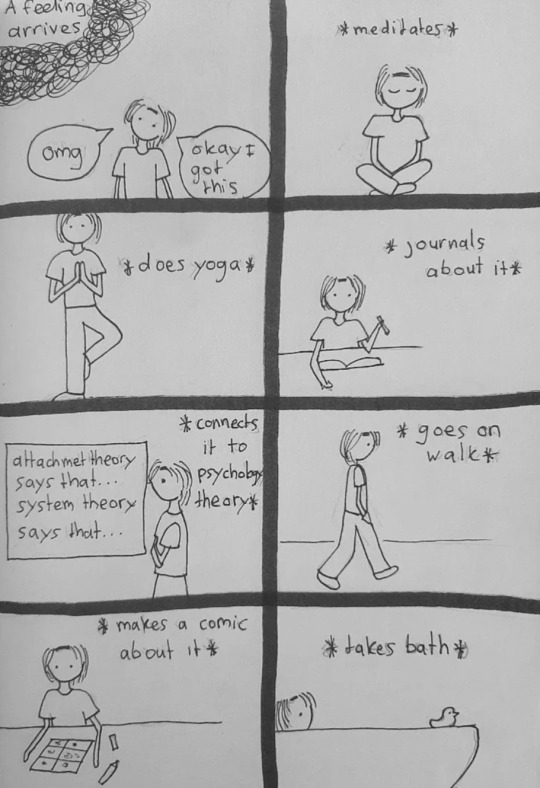
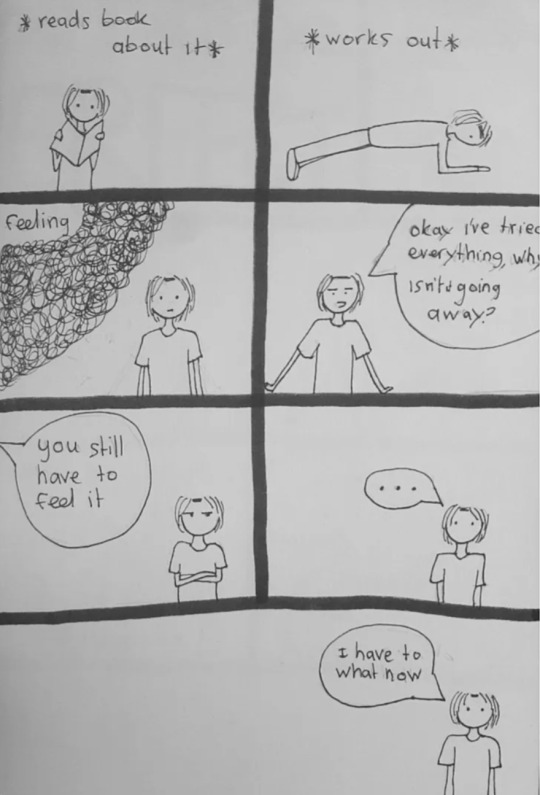
✨️ feeling your feelings ✨️
Who else hates it?
8K notes
·
View notes
